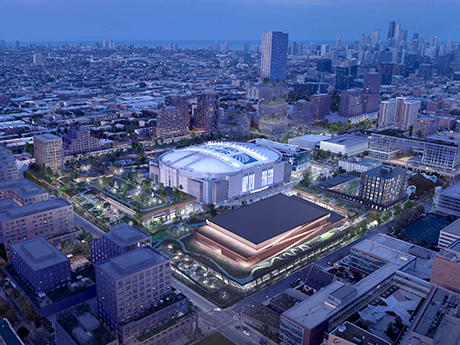CHICAGO — The owners of the NBA’s Chicago Bulls and NHL’s Chicago Blackhawks have unveiled plans for the transformation of the area around their shared venue, the United Center. The initiative is known as The 1901 Project, and development costs are estimated at $7 billion.
Michael Reinsdorf, CEO of the Bulls and son of owner Jerry Reinsdorf, formally announced the project on Tuesday, July 23. The elder Reinsdorf, along with Blackhawks owner Danny Wirtz, co-owns the United Center, where both teams have played since 1994. The name is a reference to the venue’s address at 1901 W. Madison St.
The 1901 Project will be privately funded by the Reinsdorf and Wirtz families and developed in phases over approximately 10 years. The areas in question span roughly 55 acres on the city’s west side. Phase I could commence as soon as next spring, pending the completion of various permitting and approvals processes.
Preliminary plans call for a mix of uses, including more than 1,000 transit-oriented residential units and a new entertainment venue that can accommodate up to 6,000 people. The residential component will feature both market-rate and affordable housing units. International architecture firm RIOS will lead design and planning.
The 1901 Project will also feature an elevated park as well as new hospitality, retail and restaurant uses. Various infrastructural upgrades, including reimagined parking structures, will also be undertaken to improve the area’s walkability and create a more pedestrian-friendly experience.
The development team expects the initiative to create about 63,000 construction jobs and 12,000 permanent jobs. The team also estimates that The 1901 Project would ultimately generate about $4.5 billion in stabilized economic impact and $104 million in stabilized tax revenue.
“The vision for The 1901 Project is to bring impactful investment and economic opportunity to the West Side that complements and supports its rich history and galvanizes its vibrancy,” says Danny Wirtz. “We aim to create a development alongside our neighbors to deliver jobs, housing, commerce and community resources, creating a more prosperous future for all residents.”
— Taylor Williams


